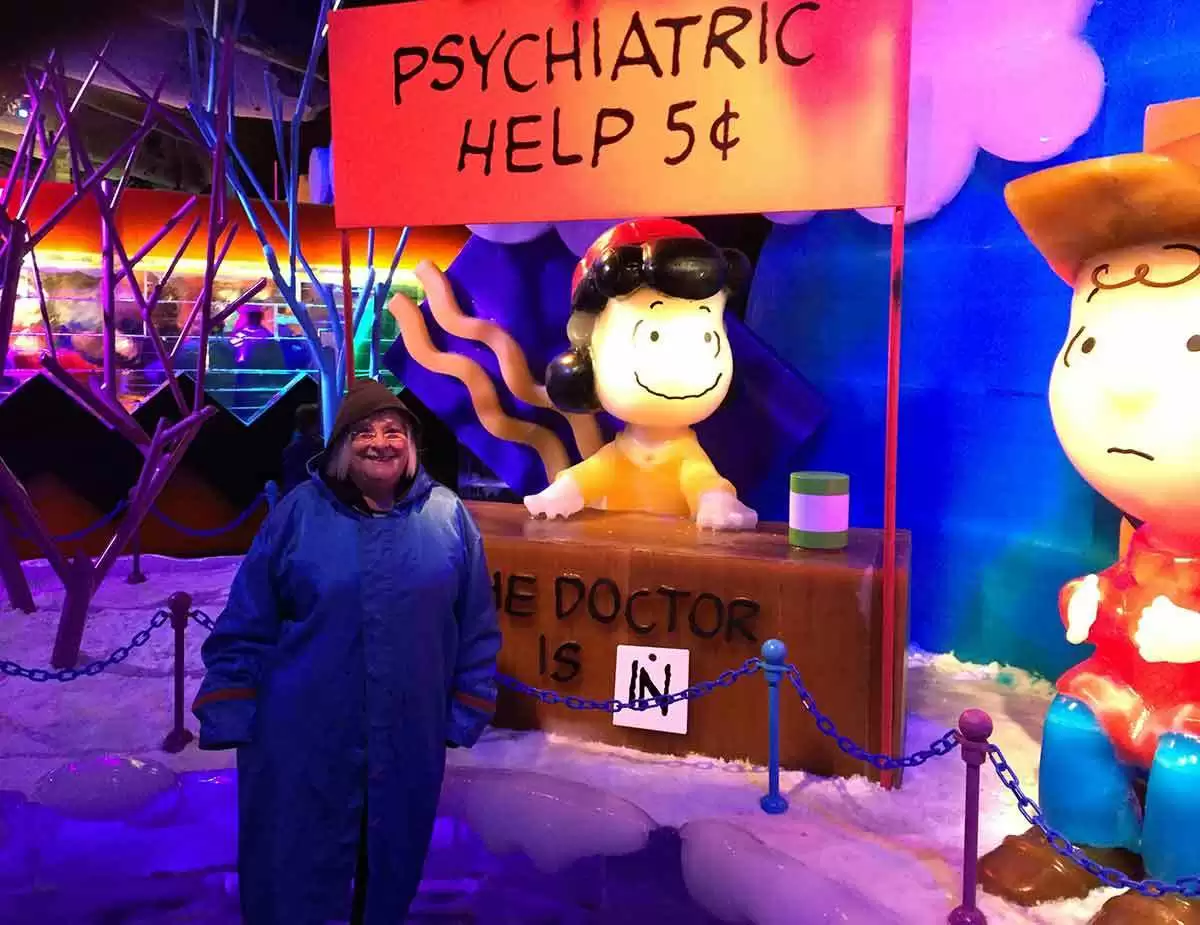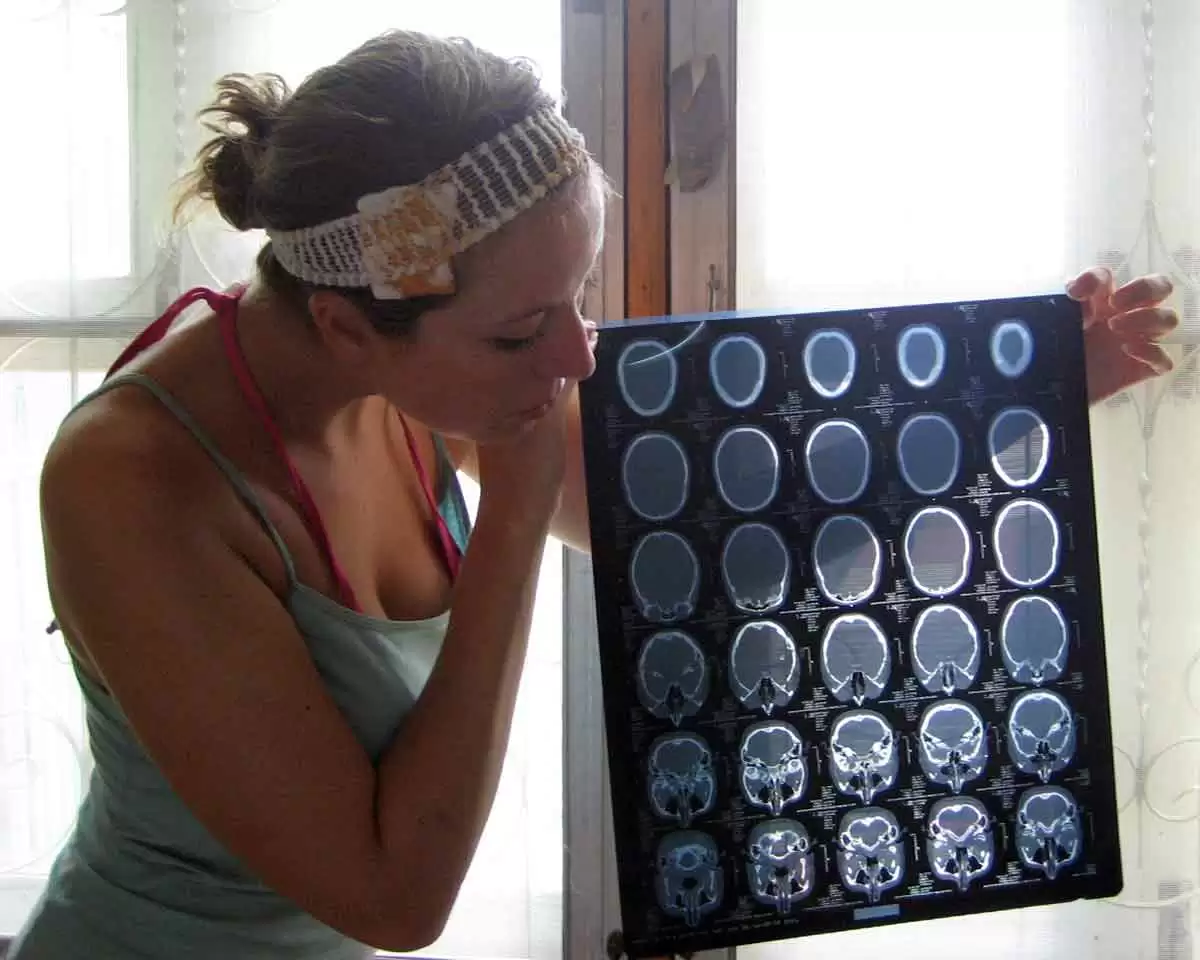-
Welcome to Celiac.com!
You have found your celiac tribe! Join us and ask questions in our forum, share your story, and connect with others.
-
Celiac.com Sponsor (A1):
Celiac.com Sponsor (A1-M):
-
Get Celiac.com Updates:Support Celiac.com!
Search the Community
Showing results for tags 'psychiatric'.
-
Celiac.com 03/27/2023 - Celiac disease, a chronic inflammatory disorder of the intestines, affects about 1% of the world's population. Celiac disease causes diarrhea, abdominal discomfort, bloating, flatulence, and, in rare cases, constipation in the digestive tract. Since the identification of gluten as the disease-causing antigen, celiac patients have been treated with a gluten-free diet, which usually eliminates symptoms and restores gut health, but which also has limitations for some patients. Celiac disease is also associated with numerous neurological and psychological manifestations. A recent article details findings from the most recent study, but here we try to provide more comprehensive information. Neurological Manifestations of Celiac Disease The neurological manifestations of celiac disease are varied and can include psychiatric and neurological symptoms such as ataxia, peripheral neuropathy, seizures, headaches, cognitive impairment, and myoclonus. The specific mechanisms of celiac disease's neurological effects are still being researched, but they may involve gluten-mediated pathogenesis that can lead to antibody cross-reactions, immune-complex deposition, direct neurotoxicity, or extreme vitamin or food deficiencies. A gluten-free diet can alleviate most celiac disease symptoms, except for cortical myoclonus and dementia, which may require immunosuppressive therapy. However, there is currently no consensus on whether serological or neurophysiological data can accurately predict or monitor celiac disease-related neurological involvement. Treatment for gluten-related neurological symptoms typically involves embarking on a strict gluten-free diet as soon as possible, which can have a positive therapeutic effect for most cases. Symptomatic management may also be required. Immunosuppression is only used in cases where a gluten-free diet alone has not been beneficial or for patients with refractory celiac disease. Peripheral Neuropathy and Gluten Ataxia Peripheral neuropathy and gluten ataxia are common in celiac patients, with up to 39% of patients experiencing gluten neuropathy. Gluten-free diets have been shown to improve neuropathy and ataxia. Gluten ataxia is an uncommon immune-mediated neurological disease that can be difficult to identify. The early signs of ataxia may be subtle, but worsen if left untreated. Patients with gluten ataxia may experience structural alterations in different parts of the brain, including the cerebellum and thalamus, and have larger lateral ventricles. Higher Epilepsy Risk Celiac disease increases the risk of epilepsy, especially in children and adolescents. The presence of villus atrophy on follow-up biopsies may reduce the risk of epilepsy but does not affect hospitalizations for epilepsy emergencies. Unexplained epilepsy should prompt celiac disease screening since early identification and therapy may increase the effectiveness of anti-epileptic drugs. Celiac patients also have a higher prevalence of migraines and tension headaches. The underlying relationship between celiac disease and headache involvement is still unknown, but adherence to a gluten-free diet can alleviate neurological symptoms. Celiac disease can also cause cognitive impairment, including memory loss, clouded thinking, personality shifts, and an inability to calculate. Nutrient deficiencies, systemic inflammation, and low brain serotonin levels have been suggested as possible reasons for this. Celiac disease has also been associated with Alzheimer's and vascular and fronto-temporal dementias. Neuropsychological assessments should be conducted in celiac disease patients to assess cognitive function. Psychiatric Manifestations of Celiac Disease Celiac disease is associated with depression, anxiety, eating disorders, autism spectrum disorder, attention deficit hyperactivity disorder (ADHD), bipolar disorder, schizophrenia, and mood disorders. The relationship between celiac disease and these psychiatric disorders is not well-known or established. Particular biological aspects as well as the effect of a gluten-free diet require additional research. Depression and Anxiety Celiac disease has been associated with various psychiatric disorders such as depression, anxiety, eating disorders, autism spectrum disorder, attention deficit hyperactivity disorder (ADHD), bipolar disorder, schizophrenia, and mood disorders. However, the relationship between these disorders and celiac disease remains unclear and requires further research. Research suggests that gastrointestinal disorders have a link with depression and anxiety due to prolonged pain and inflammation, affecting specific brain targets like the anterior cingulate cortex. Gastrointestinal disorder patients have reduced cognitive and mood status, leading to anxio-depressive phenotypes, even in the absence of clear evidence of threats. Children with celiac disease may experience anxiety and depressive symptoms, and pediatric patients with celiac disease should be frequently assessed for mental health issues, especially anxiety and sadness. Adults with celiac disease have reported experiencing anxiety and depression as well, particularly due to clinical illnesses and symptoms. Following a gluten-free diet may worsen symptoms like anxiety and fatigue, leading to a diminished quality of life. Therefore, clinicians must recognize the importance of promoting both dietary adherence and social and emotional well-being in celiac disease patients. Studies have shown that individuals with celiac disease experience low quality of life, anxiety, and depressive symptoms, and nutrition plays a crucial role in reducing these effects. However, the role of motivation in the quality of life and adherence remains unclear and requires further research. Eating Disorders Eating disorders may be a comorbidity with celiac disease (celiac disease) and the need for further investigation. celiac disease patients may experience disordered eating due to the disease itself or other factors such as food neophobia. It is crucial for gastroenterology clinicians to be aware of potential risks for eating disorders in celiac disease patients. The article notes that while numerous examples of eating disorders have been described in celiac disease patients, few epidemiological studies have investigated this potential link. One study found that patients with celiac disease had higher Eating Attitude Test scores than controls when testing individuals aged 13 and up, but no clear differences were seen between patients with celiac disease and controls when using other screening measures for ED. The article suggests that further investigations with larger samples and prospective designs are needed to corroborate these results. The article also discusses how celiac disease may cause food neophobia, which is linked to sensory aversions or fears of the negative effects of eating particular foods. This fear may be more severe in celiac disease patients than in non-celiac disease patients who choose to follow a gluten-free diet and can be linked to the possibility of having an unfavorable reaction to gluten-contaminated food products. The article emphasizes the importance of gastroenterology clinicians being aware of potential risks for eating disorders in celiac disease patients. It notes that eating disorders are defined by thoughts and actions linked to physical and/or psychological problems and that it is crucial to identify past, current, and potential risks for eating disorders in celiac disease patients. Autism Disorder Autism spectrum disorder is caused by a complex interplay of genetic and environmental factors, affecting individuals in diverse ways. Recent studies suggest that immune system dysfunction could contribute to the development of autism spectrum disorder in some people [55]. While some research suggests a connection between celiac disease, an autoimmune disorder triggered by gluten consumption that mainly affects the small intestine, and autism spectrum disorder, other studies have not found a significant association between the two conditions. Attention Deficit Hyperactivity Disorder (ADHD) Research has suggested a potential link between celiac disease and ADHD, with studies showing that celiac disease is overrepresented in ADHD patients, and a gluten-free diet improved ADHD symptoms in celiac disease patients. However, routine screening for ADHD in people with celiac disease or vice versa is not recommended. Cognitive problems similar to those seen in children with ADHD, such as a lack of focus or trouble paying attention, were linked to gluten-free diet noncompliance in childhood celiac disease, as were psychosomatic symptoms and antisocial behavior. Individuals with untreated celiac disease may be at risk for engaging in ADHD-like behavior, specifically inattention. Out of 23 studies, 13 found a favorable correlation between ADHD and celiac disease. Bipolar Disorder Bipolar Disorders refer to a group of serious and long-term mental health conditions that are characterized by manic and depressive episodes. Research has shown that people with bipolar disorder have higher levels of immunoglobulin G (IgG) antibodies against gliadin than those without a history of psychiatric illness. However, there is still a need for further investigation into the specific antibody response to gluten antigens in bipolar disorder. Close associations have also been observed between celiac disease and major depressive disorder, panic disorder, and bipolar disorder, leading to reduced quality of life. Therefore, early reporting of symptoms and screening for celiac disease is recommended, especially for those with a family history of the disease or essential symptoms. Schizophrenia Schizophrenia is a severe mental illness that increases the risk of premature death 2-4 times compared to the general population. Genetic and environmental factors, including drug abuse, especially involving cannabis, are associated with an increased risk of developing schizophrenia. Research suggests an association between schizophrenia and celiac disease, although a causal link has yet to be established. Although having elevated antibodies against gliadin is a common immunological abnormality between schizophrenia and celiac disease, most patients with schizophrenia who had elevated anti-gliadin antibodies (AGA) did not have celiac disease. However, there is evidence that a gluten-restricted diet may benefit schizophrenia patients with immunological gluten sensitivity. One treatment-resistant schizophrenia patient with immunological gluten sensitivity benefited from a gluten-restricted diet improvement in both mental and physical symptoms, as well as a reduction in the plasma quantitative level of AGA-IgG. Chronic inflammation, which is thought to increase due to gluten intolerance, may worsen the symptoms of schizophrenia and make it harder for patients to respond to treatment and absorb medications. Schizophrenia patients also have a higher rate of digestive and liver problems. While removing gluten from the diet may alleviate some symptoms, it is not recommended for all patients. Gluten intolerance is believed to increase chronic inflammation, exacerbating symptoms and reducing medication absorption. However, the available data on the link between celiac disease, gluten allergies, and schizophrenia are inconsistent, and a gluten-free diet is not recommended for people with psychosis and mood disorders without further research. Other Psychiatric Disorders Previous research has shown that people with celiac disease are more likely to suffer from neuropsychiatric disorders than the general population. So far, more than 60 non-human leukocyte antigen (HLA) genes have been linked to celiac disease by genome-wide association studies; of these, it is believed that 15% have a role in neurological health. Many common neuropsychiatric disorders include celiac disease as a primary predisposing factor. It's possible that the co-occurrence of diseases is in large part due to shared molecular networks and biological processes. To determine what causes these disorders, we need to look at the underlying molecular mechanisms. Celiac disease was associated with an increased risk of psychiatric problems in children, raising their lifetime risk by 1.4 times that of the general population. Celiac disease in children has been linked to an increased likelihood of developing psychosocial difficulties later in life, including depression, anxiety, eating disorders, antisocial behavior, attention deficit hyperactivity disorder, autism spectrum disorder, and intellectual disability. It was also more common to have been diagnosed with a mood, eating, or behavioral condition prior to the celiac disease diagnosis. In contrast, no elevated risk was found for any of the psychological diseases studied in the siblings of people with celiac disease. A cohort study included nearly 20,000 children with biopsy-verified celiac disease, pairing each patient with 5 reference child controls. Approximately 16.5% of celiac children were diagnosed with a psychological condition during a median follow-up of 12.3 years, compared to 14.1% of controls. Celiac disease in childhood increased the risk of psychiatric illness by 19% and this risk increases during maturity, in particular, mood, anxiety, eating, ADHD, and autism spectrum problems. There was no statistically significant increase in psychotic disorders, psychoactive substance use, behavioral disorders, personality disorders, suicide attempts, or suicides. Celiac disease increases the use of psychiatric medication. Psychological issues associated with celiac disease were also more prevalent. As a result, the attending physician should conduct routine surveillance of potential psychiatric symptoms in patients of all ages who have gluten-related diseases, including both children and adults. Conclusions In conclusion, celiac disease has been linked to numerous neurological and psychiatric conditions, including depression, anxiety, eating disorders, autism spectrum disorder, attention deficit hyperactivity disorder (ADHD), bipolar disorder, schizophrenia, and mood disorders. Clinicians should assess mental health factors when making a celiac disease diagnosis. Overall, the relationship between celiac disease and these neurological and psychiatric disorders is not well-known or established. More research is needed to understand the pathophysiology of celiac disease's neurological and psychiatric manifestations. Particular biological aspects as well as the effect of a gluten-free diet require additional research. Read more at Cureus.com
-
Celiac.com 01/19/2021 - Typically, when people with celiac disease eat gluten, they experience gastrointestinal discomfort, or even symptoms like a skin rash, anemia, and headaches. In some extreme cases, though, the side effects could be much, much worse. But, in rare cases, celiac disease can manifest with psychiatric symptoms and behavioral disturbances. Interestingly, celiac disease in children often manifests mainly as behavioral disturbance, such as increased aggression or anxiety, with milder or absent gastrointestinal symptoms. That was the case with a 37-year-old, successful PhD student, from Massachusetts. Woman Begins to Have Delusions The woman began experience severe unexplained hallucinations, paranoia. She became convinced that everyone she knew were conspiring against her, and that friends, family members and even strangers were acting out pre-scripted scenes in some kind of a “game.” Her dissociation from reality became so severe that she alarmed those around her, and they sought to get her help. Doctors Suspect Psychotic Disorder The woman was admitted to a psychiatric hospital, where doctors diagnosed a psychotic disorder, and prescribed powerful antipsychotic drugs in order to control her symptoms. However, the drugs had practically no effect. On follow-up, the doctors found the woman suffered from numerous mineral and vitamin deficiencies, along with thyroid problems. She had also lost a substantial amount of weight. Eventually, they screened her for celiac disease, and discovered that she had it. Doctors Confirm Gluten Causing Woman's Delusions Once the doctors confirmed celiac disease, they advised the woman to avoid gluten, and eat a standard gluten-free diet. However, the woman's delusions had not subsided, and she regarded the doctors as just another part of the conspiracy of people working against her. This belief led her to completely disregarded the gluten-free diet. Sadly, the woman's condition spiraled out of control, and she soon lost her job, her home, and became alienated from her family and friends. After becoming homeless and desperate, the woman unsuccessfully attempted suicide. Fortunately, she was returned to the hospital, where she began to embrace a gluten-free diet. Return to Normal on a Gluten-Free Diet According to Dr. Alessio Fasano, Director of the Center for Celiac Research and Treatment at Massachusetts General Hospital, the woman's condition improved quickly. In no time, she was able to think clearly, and to understand that gluten had been causing her to have serious mental problems. The woman was remorseful, and apologetic for causing so much trouble. Eating Gluten Leads to Murder Attempt The woman began to follow her prescribed diet, but, after accidentally eating gluten, her psychosis returned, and she attempted to kill her parents. Thankfully, she did not succeed, but she was arrested, tried, and sent to prison. The woman's case proves that, in rare cases, celiac disease can cause severe psychotic and other behavioral symptoms. The Link Between Gluten and Psychosis Researchers don't have much good information on the connection between gluten disease and mental disorders. Dr. Fasano suspects a connection lies in the human immune system. When people with celiac disease eat gluten, they typically experience inflammation of the gut. Dr. Fasano believes that, in some cases, such as with the woman in question, gluten-triggered inflammation moves beyond the gut to the brain, which could explain the kind of psychotic delusions experienced by the woman. A better understanding of the connection between gluten and psychosis in such cases could help improve the treatment of celiac disease and gluten sensitivity. Until then, cases such as this are a reminder of just how much we don't know, and how much further we have to go in learning about and treating celiac disease in all its manifestations. Read more at oddee.com and nejm.org
- 5 comments
-
- celiac
- celiac disease
-
(and 6 more)
Tagged with:
-
Celiac.com 09/26/2022 - Celiac disease is on the rise, and so are the gastrointestinal and other symptoms that go with it. A number of researchers have documented connections between various psychiatric disorders and celiac disease. However, the relationship between celiac disease, and such psychiatric disorders is not well studied or documented. A team of researchers recently set out to provide a greater understanding of the existing evidence and theories surrounding psychiatric manifestations of celiac disease. The research team included Emma Clappison, Marios Hadjivassiliou, and Panagiotis Zis. They are variously affiliated with the Medical School of the University of Sheffield, Sheffield, and the Academic Department of Neurosciences, Sheffield Teaching Hospitals NHS Foundation Trust and University of Sheffield, Sheffield. Their systematic review and meta-analysis appears in a special issue on gluten-related disorders, titled, Time to Move from Gut to Brain. The team conducted a search of online medical literature search using PubMed, pulling data on rates of celiac disease and psychiatric disorders from eligible articles. They then conducted a meta analysis of odds ratios. For their review, the team found a total of 37 articles that met their eligibility parameters. Compared with healthy controls, the team found people with celiac disease to have a significantly higher risk for autistic spectrum disorder, attention deficit hyperactivity disorder, depression, anxiety, and eating disorders. They found no significant differences for bipolar disorder or schizophrenia. The study revealed that celiac disease is associated with a higher risk of depression, anxiety, eating disorders, along with ASD and ADHD. The team is calling for more research into the specific biological reasons underpinning this connection, along with the potential benefits of a gluten free diet in improving these conditions. Read more in Nutrients 2020, 12(1), 142
- 2 comments
-
- anxiety
- celiac disease
-
(and 4 more)
Tagged with:
-
Celiac.com 10/29/2021 - Ron Hoggan's book Dangerous Grains has been an enormous help toward understanding something bizarre that happened to my 19 year old son, Lee, in the past year. Lee suddenly began acting psychotic one day last October and eventually had what appeared to be some kind of seizure. He lay on the couch, tensed up, and started shaking violently. His eyes were rolling back into his head and he was vocalizing loudly. After a period of time he came out of it and was somewhat lucid but seemed dazed, and very confused. We took him to the emergency room where he underwent a battery of tests that revealed nothing out of the ordinary. During the wait, he had two more of the seizure-like episodes. A psychiatrist was phoned and he was given neuroleptic drugs. He went to the epilepsy ward for further testing -EEG, CT scans and MRI's that did not reveal anything obviously wrong. Fortunately, we were able to stay with him. On the morning of the second day he seemed better and we talked while he ate breakfast. Thirty minutes later he was having an episode- again shaking and vocalizing, and after a couple of hours started to come out of it. We noticed this pattern- eating, followed shortly afterward by seizure-like episodes and psychosis which gradually cleared enough to converse. I started to notice what he was eating and the common denominator was wheat. I gave him some rice and vegetables from home and there was no reaction, but bagels, bread, muffins and gravy all seemed to bring about the same violent reaction. I have food allergies and am aware that wheat is a common allergen (I learned to avoid it years ago), but I couldn't understand how he could be affected in such an extreme manner, so quickly after eating. He was moved to a locked psychiatric ward, diagnosed with possible bipolar disorder or non-specific schizophrenia, and the neuroleptics were continued. Of course, his psychiatrist didn't want to hear about my observations regarding Lee's apparent reaction to wheat. (My wife and daughter also witnessed it on several occasions.) I told the psychiatrist that Lee hadn't been having any mental changes lately but had been complaining about digestive problems and I requested a biopsy to confirm celiac disease. It was promptly denied, but I was able to get the hospital dietitian to put him on a gluten-free diet (unknown to the psychiatrist who rarely saw him, but was happy to prescribe ever increasing doses of neuroleptics). The seizures stopped the very next day- the staff no doubt assumed the drugs were having an effect in spite of my revelation about the gluten-free diet. Over the next several weeks Lee became more psychotic and suffered terrible side-effects from the drugs. The county brought him to court and had him committed. He was ordered to continue the neuroleptics, and there seemed to be little we could do. Eventually he was sent to a halfway house, but a couple of weeks after arriving he started to become catatonic. (I had told the staff about the wheat reaction but they were unable to provide a gluten-free diet). We took him to the emergency room where we learned that he was extremely dehydrated. He had lost the urge to eat or drink and was becoming very psychotic. The hospital was full, so he was sent to a sister hospital. By the time the ambulance arrived, he was completely catatonic - unable to speak and incontinent. At the new hospital, he had a new psychiatrist. She was alarmed at the dosages of drugs he was receiving and felt he was probably experiencing the beginning of ‘neuroleptic malignant syndrome,' a potentially fatal reaction to neuroleptics. The drugs were discontinued but he remained catatonic and was given Electro Convulsive Treatment several times a week. (I also spoke with the dietician when he was admitted and had Lee placed on a gluten-free diet - which was halfheartedly followed). After a few ECT treatments (and a mostly gluten-free diet) he started to come out of it. His new doctor began to realize that he didn't seem to have any mental illness at all (now that the neuroleptics had been discontinued, the catatonia was lifting and diet was improving) and called in several specialists for a more thorough evaluation. I told her about the reaction to wheat but she refused to believe there could be a connection. Finally, another neurologist was brought in and he had the insight to give him a gliadan antibody test and found that he was extremely reactive. He was finally "officially" put on a gluten-free diet (we had been bringing him food from home and doing everything we could behind the scenes to keep gluten from him). He continued to improve, in spite of the side effects of the ECT. His psychiatrist couldn't really understand what was going on with him but began to trust us enough to release him, drug-free, into our care. Three months after the ordeal began, he finally came home and is clearer now than he's been in years. He's always been kind of quiet and we realize now that gluten has probably been affecting him for years. He has done an excellent job of following the gluten-free diet, is working full time, and starts college in a few weeks. Shortly after he came home, my mother came across Dangerous Grains and bought it for me. It all finally makes sense and I plan to send copies to Lee's psychiatrist and neurologist. We saw countless people in the locked psychiatric wards who were suffering and, with the exception of the chemical dependencies everyone was on some type of drug or drugs. Many were receiving ECT on a routine basis. I know my son is not unique - testing and gluten-free diets could save many of these poor souls from a lifetime of drugs and suffering. I want to do everything I can to increase the knowledge of these professionals and Dangerous Grains seems the perfect vehicle. So great thanks to Ron Hoggan (and Dr. Braly and the rest) for doing what you're doing. I know it's only a matter of time before the people that control the mental health system become enlightened enough to stop doing harm and truly begin to heal these patients. It was a close call for us and I realize Lee is a living example.
- 16 comments
-
- gluten
- psychiatric
-
(and 5 more)
Tagged with:
-

Does Celiac Disease in Kids Mean Greater Psychiatric Risk?
Jefferson Adams posted an article in Spring 2017 Issue
Celiac.com 05/16/2017 - A number of studies have indicated that kids with celiac disease face an increased risk for mood disorders, anxiety and behavioral disorders, ADHD, ASD, and intellectual disability. A new study by a team of researchers in Sweden puts it more precisely. They put the increased risk for psychiatric disorders in children with celiac disease at 1.4-fold over kids without celiac disease. The research team assessed the risk of any type of childhood psychiatric disorders, including psychosis, mood, anxiety, and eating disorders, psychoactive substance misuse, behavioral disorder, ADHD, ASD, and intellectual disability, in children aged 18 and younger, along with their siblings. The researchers included Agnieszka Butwicka, MD, PhD, of the department of medical epidemiology and biostatistics, Karolinska Institute, Stockholm, Sweden, and colleagues. For each of the 10,903 children with celiac disease, the research team randomly selected 100 non-celiacs from the general population. These control subjects were then matched by gender and year and country of birth. For each of the 12,710 siblings of celiac disease subjects, the research team randomly assigned 100 healthy control siblings from the general population. These were also matched by gender, year and country of birth of both siblings. Both sets of siblings were required to be free of celiac disease to age 19. The researchers reviewed histological data on patients who showed villous atrophy in small intestine biopsy specimens between 1969 and 2008, and equated villous atrophy with celiac disease. In the main cohort study, the researchers estimated the risk for any psychiatric disease, as well as specific psychiatric disorders (ie, mood, anxiety, eating, and behavioral disorders, as well as neuropsychiatric disorders such as attention deficit hyperactivity disorder (ADHD), autistic spectrum disorders (ASD), and intellectual disability) in children with celiac disease, compared with general population controls. They used sibling analyses to assess whether underlying familiar factors could account for the associations. As a comparing factor, they compared the risk for psychiatric disorders in the siblings against the risk in siblings of the general population. The team conducted both univariate and multivariate analyses, adjusting for maternal/paternal age at the child's birth, maternal/paternal country of birth, level of education of highest-educated parent, and the child's gestational age, birthweight, Apgar score, and history of psychiatric disorders prior to recruitment. During follow-up, 7.7% of children were diagnosed with a psychiatric disorder. A positive association was found in the first univariate analysis between celiac disease and any psychiatric disorder, which remained even after the researchers adjusted for maternal/paternal age at childbirth and country of birth, parental education level, and child's gestational age, birthweight, Apgar score, and previous history of psychiatric disorders. The overall prevalence of psychiatric disease in the entire sample celiac disease patients was about 7%. That number remained steady in the 10 years after biopsy. However, once the researchers analyzed the findings by cohort, they found that rates of psychiatric disorders had actually increased 8-fold over that 10-year period. The siblings of celiac disease patients showed no increased risk for any psychiatric disorder. The study showed that psychiatric disorders "may precede a diagnosis of celiac disease in children." The research team called this finding "important." They write that their study also offers "insight into psychiatric comorbidities in childhood celiac disease over time." The study showed that children with celiac disease definitely faced an elevated risk for specific psychiatric disorders, including mood disorders, anxiety disorders, eating disorders, behavioral disorders, ADHD, ASD, and intellectual disability. Although the study showed that patients with celiac disease are more likely to have prior psychiatric disorders, the team notes that they have yet to determine "the mechanisms underlying the association between celiac disease and psychiatric orders." The fact that the siblings of celiac disease patients showed no increased risk of psychiatric disorders indicates that these may be an "effect of celiac disease per se rather than common genetic or within-family environmental factors," the researchers add. The researchers conclude that their study "underscores the importance of both mental health surveillance in children with celiac disease and a medical workup in children with psychiatric symptoms." This study offers yet another piece in the complex puzzle that is celiac disease. It emphasizes the need for doctors and parents to remain on the lookout for potential psychiatric issues when dealing with children who have celiac disease. Source: Psychiatry Advisor-
- behavioral disorders
- celiac
- (and 8 more)
-
Celiac.com 10/08/2021 - I live near Montréal, in Québec country and I’m webmaster of a new French web site called SOSGLUTEN.CA devoted to gluten sensitivity. The first time I saw the word “gluten” was in year 2000. At that moment my wife, Danielle, was very sick and while she was waiting for a diagnosis from her doctor, I discovered an ailment called “celiac disease” on the Web. That was my first meeting with the word “gluten”. When she went to the doctor to finally receive what is, effectively, a diagnosis of celiac disease, she had already been on a gluten-free diet for three weeks, based on my own findings. After that, I continued to read, read, and read again, anything on the web concerning celiac disease and gluten sensitivity. In 2002 when my youngest daughter, Manon, received a diagnosis of anxiety and depression, I requested a blood screening for celiac disease. As you may have expected, the doctor initially refused. It was only after my insistence that he finally ran these tests. From this, Manon received a diagnosis of celiac disease and she stopped having to take Paxil after six gluten-free months. In 2003, I helped a sister of my wife, Suzanne, to understand that gluten might be behind her skin disease and other health problems. She finally received a diagnosis of dermatitis herpetiformis and celiac disease after seeking a second medical opinion. In 2004, I also helped another sister of my wife, Noelline, to understand that gluten might also be behind her bone pain, joint pain and many other health problems. Despite two negative blood tests and two negative biopsies, she started a gluten-free diet and it turned out to be the best decision of her life. Moore recently, in 2005, I requested, for me and my son Eric, the opinion of Dr. Kenneth Fine via Enterolab. My son, a young engineer of 25 years old had joint finger pain and he was always a little bit depressive. I frequently had esophageal reflux, indigestion with chest pain, and insomnia since I was three or four years old (I’m now 53 years old). The diagnosis from Dr. Fine was a diagnosis of gluten sensitivity for my son Eric with a copy of HLA DQ2 gene (from his mother) and for me a diagnosis of gluten sensitivity with only gluten sensitive genes. Today, we are all on a gluten-free diet and have been since Christmas 2005, and all symptoms have disappeared for Eric and me. As you can understand, avoiding gluten is in the center of our lives, and that is the reason I have decided to create a French web site devoted to celiac disease and gluten intolerance. I now have personal proof that gluten intolerance is not limited to celiac disease. To conclude, the main goal of this article is to share my family’s experiences with you, and to ask you to visit my web site at: https://www.sosgluten.ca.
- 2 comments
-
- french
- gluten sensitivity
-
(and 4 more)
Tagged with:
-
Celiac.com 04/15/2021 - Cases of celiac disease are on the rise. Celiac disease is associated with both gastrointestinal (GI) and extra-intestinal manifestations, with psychiatric disorders being among the most common extra-intestinal manifestations. The connection between celiac disease and associated psychiatric disorders has not been well documented or studied. A team of researchers recently set out to provide a greater understanding of the existing evidence and theories surrounding psychiatric manifestations of celiac disease. The research team included Emma Clappison, Marios Hadjivassiliou, and Panagiotis Zis. They are variously affiliated with the Medical School, University of Sheffield, Sheffield S10 2YN, UK; and the Academic Department of Neurosciences, Sheffield Teaching Hospitals NHS Foundation Trust and University of Sheffield, Sheffield UK For their study, the team conducted an online literature search using PubMed to locate eligible articles containing data on the rates of both celiac disease and psychiatric disorders. They also conducted meta analyses on odds ratios. In all, the team located 37 eligible articles. They detected a significant increased risk for patients with autistic spectrum disorder, attention deficit hyperactivity disorder, depression, anxiety, and eating disorders amongst the celiac disease population compared to healthy controls. They found no significant differences for bipolar disorder or schizophrenia. The data connects celiac disease to an increased risk of depression, anxiety, eating disorders, as well as ASD and ADHD. They point to the need for more research to investigate specific biological explanations as well as the potentially beneficial effects of a gluten-free diet. Data can be helpful in showing connections, and certainly the connection between celiac disease and psychiatric conditions is worthy of study, but further studies are crucial to understanding the connection in any meaningful way. Read more at MDPI.comNutrients 2020, 12(1), 142;
- 4 comments
-
- associated
- celiac disease
-
(and 4 more)
Tagged with:
-
Celiac.com 08/25/2020 - A number of studies describe psychological disorders, in addition to other extra intestinal manifestations of celiac disease, such as fatigue, neurological conditions including headache and neuropathy. However, there hasn't been study with robust enough data to provide accurate risk estimates. In an effort to obtain accurate risk estimates, Jonas F. Ludvigsson, MD, PhD, of the department of medical epidemiology and biostatistics at Karolinska Institutet in Sweden, and colleagues analyzed data from the Swedish nationwide ESPRESSO cohort to explore associations between childhood celiac disease and psychiatric disorders. They matched nearly 20,000 children with biopsy verified celiac with up to five of 100,000 reference children, and gathered data on psychiatric disorders from the patient register. During a follow-up period of just over 12 years, nearly 17% of 3,174 children with celiac disease were diagnosed with a psychiatric disorder, compared with about 14% of the 13,286 control subjects. People with childhood celiac disease had a nearly 20% increase in risk for any psychiatric disorder, an increase seen in every childhood age group. Specifically, celiac patients faced elevated risks for mood disorders, anxiety disorders, eating disorders, attention deficit hyperactivity disorder, autism spectrum disorder, and increased use of psychiatric drugs. The risk was highest in the first year after celiac diagnosis, but continued into adulthood. The results of this study underline the importance of mental health monitoring in people diagnosed with celiac disease as children. Because of the elevated risk of psychiatric disorder, the team advises that people diagnosed with celiac disease in childhood receive both physical and mental monitoring into adulthood. Stay tuned for more on this and related stories. Read more at Healio.com.
-
- anxiety
- celiac disease
- (and 6 more)
-
Celiac.com 05/04/2012 - Some studies have shown that people with untreated celiac disease can have higher rates of psychiatric disorders, but little study has been made to determine whether people with psychiatric disorders have higher rates of celiac disease. To answer that question, a team of researchers recently studied celiac disease in patients with chronic psychiatric disorders. The research team included Manouchehr Khoshbaten, Mohammad Rostami Nejad, Nasrin Sharifi, Ali Fakhari, Mahdyar Golamnejad, Sayed Hassan Hashemi, Pekka Collin, and Kamran Rostami The team set out to assess rates of celiac disease in Iranian patients suffering from chronic depression or schizophrenia. For their study, they screened 200 Iranian inpatient men with in chronic phase of depressive disorders or schizophrenia, along with another 200 age-matched healthy male subjects, for celiac disease using anti-tissue transglutaminase IgA antibodies. The average patient age was 37 years. This study found that one (1%) schizophrenic and two (2%) depressive patients tested positive for anti-tissue transglutaminase IgA antibodies. They noted that duodenal biopsy was not possible in these male patients. In the control group one (0.5%) individual was positive for anti-tissue transglutaminase IgA antibodies, but had normal duodenal histology. Theere was no statistical difference between patients and control group. Celiac disease serology is not significantly higher in schizophrenic and depressive inpatients than in the general population. Based on this observation, they do not advocate systematic blood screening in such patients, but they do advocate increased alertness to the possibilities of celiac disease in those patients. Source: Gastroenterology and Hepatology
- 4 comments
-
- celiac
- celiac disease
-
(and 5 more)
Tagged with:
Celiac.com Sponsor (A8):
Celiac.com Sponsor (A8):
Celiac.com Sponsor (A8-M):
Celiac.com Sponsor (A8):
Celiac.com Sponsor (A8):
Celiac.com Sponsor (A8-M):










.webp.221482f478bea455a2dab99606196255.webp)